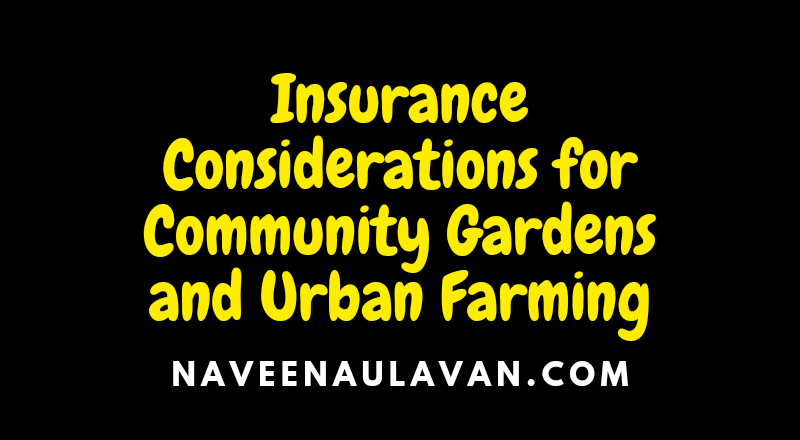Community gardens and urban farming have gained popularity in recent years as individuals and communities seek sustainable, locally sourced food options and promote green spaces in urban areas. However, as these initiatives grow in scale and complexity, it becomes essential to address the potential risks and liabilities involved. This article aims to explore the insurance considerations that community gardens and urban farming projects should keep in mind to protect themselves, their participants, and their assets.
Understanding the Risks
Before diving into insurance solutions, it is crucial to identify the specific risks associated with community gardens and urban farming. Some common risks include:
1. Property damage: Community gardens and urban farms may be susceptible to damage caused by natural disasters, vandalism, theft, and even accidents.
2. Personal injury or liability: Accidents occurring within the garden or farm, such as slips, falls, or even insect or animal bites, could lead to personal injury claims or litigation.
3. Crop failure or loss: Adverse weather conditions, pests, diseases, or even equipment failures can result in crop failure or loss, potentially impacting the financial viability of the project.
Types of Insurance Coverage
To mitigate the risks associated with community gardens and urban farming, it is essential to consider the following types of insurance coverage:
1. Property Insurance
Property insurance is vital for protecting the physical assets associated with community gardens and urban farming, including structures, equipment, tools, plants, and harvested crops. This coverage helps in the event of damage caused by fire, storms, theft, or other covered perils.
2. General Liability Insurance
General liability insurance provides coverage for claims of bodily injury, property damage, or personal injury arising from activities related to the community garden or urban farm. This coverage protects against lawsuits and medical expenses resulting from accidents or injuries on the premises.
3. Product Liability Insurance
Product liability insurance is particularly important for community gardens and urban farms that sell or distribute their produce. This coverage protects against claims relating to illness, injury, or property damage caused by products sold or supplied by the project.
4. Workers’ Compensation Insurance
If the community garden or urban farm has paid employees or volunteers, it may be legally required to carry workers’ compensation insurance. This coverage provides medical benefits and wage replacement for workers who are injured or become ill while performing their duties.
5. Crop Insurance
Crop insurance helps protect community gardens and urban farms against losses due to crop failure, specified natural disasters, or other covered perils. This coverage can be vital for securing the financial stability of these projects, especially when external factors beyond their control impact crop productivity.
Additional Considerations
Aside from the core insurance coverages mentioned above, there are a few additional considerations to keep in mind:
1. Landowner’s Insurance
If the community garden or urban farm is operating on rented or borrowed land, it is essential to verify whether the landowner carries adequate liability insurance coverage. This will help ensure that the project is protected from any claims or lawsuits arising from accidents or injuries on the premises.
2. Special Event Insurance
If the community garden or urban farm hosts events or activities such as workshops, fundraisers, or tours, it may be wise to consider special event insurance. This coverage protects against potential liabilities associated with these events, including injuries or accidents involving participants.
Conclusion
Community gardens and urban farming projects offer numerous benefits to individuals, communities, and the environment. However, it is crucial to address the associated risks and liabilities through proper insurance coverage. By understanding the specific risks, considering the essential insurance types, and evaluating additional considerations, these initiatives can protect themselves and their stakeholders. Partnering with an experienced insurance provider will ensure that community gardens and urban farms have tailored coverage that mitigates risks and provides financial security for the longevity and success of their projects.
